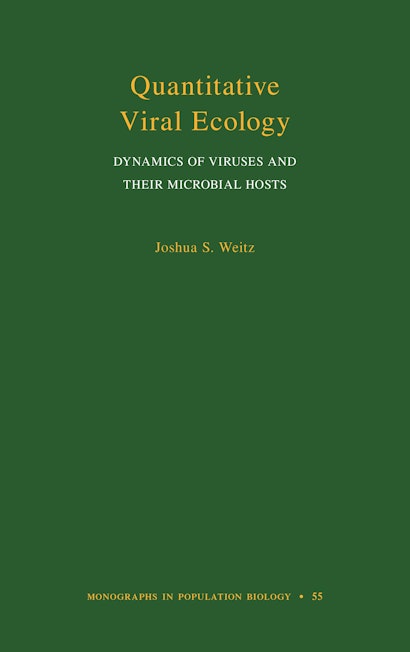When we think about viruses we tend to consider ones that afflict humans—such as those that cause influenza, HIV, and Ebola. Yet, vastly more viruses infect single-celled microbes. Diverse and abundant, microbes and the viruses that infect them are found in oceans, lakes, plants, soil, and animal-associated microbiomes. Taking a vital look at the “microscopic” mode of disease dynamics, Quantitative Viral Ecology establishes a theoretical foundation from which to model and predict the ecological and evolutionary dynamics that result from the interaction between viruses and their microbial hosts.
Joshua Weitz addresses three major questions: What are viruses of microbes and what do they do to their hosts? How do interactions of a single virus-host pair affect the number and traits of hosts and virus populations? How do virus-host dynamics emerge in natural environments when interactions take place between many viruses and many hosts? Emphasizing how theory and models can provide answers, Weitz offers a cohesive framework for tackling new challenges in the study of viruses and microbes and how they are connected to ecological processes—from the laboratory to the Earth system.
Quantitative Viral Ecology is an innovative exploration of the influence of viruses in our complex natural world.
Awards and Recognition
- Winner of the 2016 Postgraduate Textbook Prize, Royal Society of Biology
Joshua S. Weitz is associate professor of biology at the Georgia Institute of Technology.
"Outstanding. . . . An impressive scholarly endeavor and overview of the field. . . . Despite its complex subject matter, the book is pleasingly readable and its content fully digestible by a non-expert."—Dr. Ian Turner, The Biologist
"Quantitative Viral Ecology is exactly the book we need for the field. Until now everyone had to go to the primary literature to find good quantitative arguments in virology, but in this book, Weitz provides us with necessary principles and clear explanations. This volume will be useful for students new to the subject as well as anyone needing to refresh their knowledge of the discipline."—Forest Rohwer, San Diego State University
"Joshua Weitz delivers a beautifully written book that captures the important and rapidly growing field of modern viral ecology. As one of the emerging leaders of the field's transformation into a quantitative discipline, Weitz provides many clear, accessible examples of how mathematical modeling can lead to dramatic new insights into virus-host interactions and the rich variety of phenomena that accompany them. This is a book that can be profitably read by researchers at all levels, whether from a biological or quantitative background."—Nigel Goldenfeld, University of Illinois, Urbana-Champaign
"Drawing upon theoretical methods used in ecology and virology, as well as developing new approaches, Weitz has produced a pathbreaking book that provides a synthesis of existing knowledge and a way forward to original discoveries."—Alan Hastings, University of California, Davis
"Mathematical models are necessary tools for understanding the population dynamics of viruses. A large value of this book is its potential as a bridge between pure modeling and experimental/observational work in the field. Weitz's knowledge of the historical background is excellent and he uses entertaining, informative content and highly relevant cases throughout."—Tron Frede Thingstad, University of Bergen
"In recent years, there has been a swelling wave of awareness by microbiologists and ecologists regarding the significance of viruses in natural environments. In this book, Weitz synthesizes a wide range of empirical knowledge with rigorous population dynamical models to encapsulate the interactions among viruses and their microbial hosts. Weitz is at the top of his field and his breadth of knowledge is impressive."—Robert D. Holt, University of Florida

